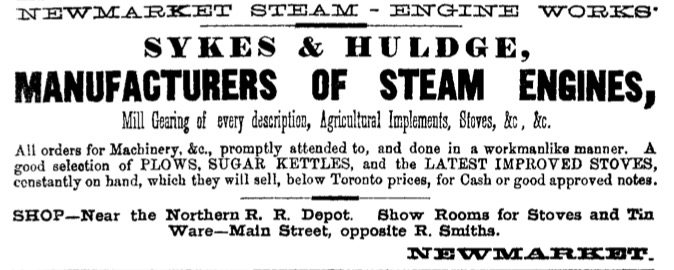In 1853 English emigrant Samuel Sykes was working in Toronto for Good's Foundry where he supervised the construction of the first locomotive built in Canada. By 1857 Samuel Sykes was in business in Newmarket, Ontario, as an iron founder, machinist and engine builder.
In 1866 the Newmarket Steam Engine Works, operated by Sykes & Huldge, were making steam engines.
By 1867 Sykes was partnered with Charles Elvidge as Sykes & Elvidge, operating the Newmarket Steam Engine Works. In 1874 Sykes sold his interest in the business to William Cane and a new partnership was formed, Cane & Elvidge. The following year the foundry burned down, without insurance. A new foundry was built.
The connection to Cane & Elvidge is unclear, but by 1882 Lundy & Elvidge was operating a foundry in Newmarket.
 |
| From Mitchell & Co.'s 1866 Toronto Directory |
Information Sources
- John Lovell's 1857-58 Canada Directory lists "Sykes" as an iron founder.
- 1869 Robertson & Cook's The Province of Ontario Gazetteer and Directory lists "Sykes & Elvidge (Samuel Sykes & Charles Elvidge), founders and machinists" in Newmarket.
- 1875-05-04 The Globe.
NEWMARKET, May 3.—At a few minutes after 12 o'clock, just after the workmen had gone to dinner, a fire was discovered to be issuing out of the large foundry of Cane & Elvidge. The wind blowing a terrific gale from the west rendered any assistance from the fire brigade powerless, and in an hour and half the foundry and all the workmen's houses were lying a mass of debris. Great efforts were made to save the sash factory and a large saw-mill, recently erected by Messrs. Cane & Sons, which were successful. Great sympathy is manifested for Messrs. Cane & Elvidge, and for the firm of Messrs. Cane & Sons. The foundry had only changed hands the from the old firm of Sykes & Elvidge last fall. Mr. Cane had expended a large amount of capital in this town within the last nine months. His coming had augmented considerably the list of ratepayers already, as the late assessment shows that the increase entitles us to a Deputy Reeve at the next election. There will be a public meeting to take into consideration the propriety of aiding Messrs. Cane & Elvidge to again erect the foundry. Loss, fully $20,000. No insurance.
- 1882 The Mercantile Agency Reference Book and Key lists Lundy & Elvidge as a Newmarket foundry.
- 1883 Farley's Directory of the Metal Workers of the United States lists Lundy & Elvidge as iron founders in Newmarket, Ont.
- The 1885 book, History of Toronto and County of York, Ontario has a biography of a William Cane., which says, "His settlement in Newmarket dates from 1875, in which year he established the business which has now such an extensive connection. He also bought S. Sykes' foundry and engine works. The foundry was burned in the spring of 1876."
- From January 1905 The Canadian Engineer, in an article on "Progress in Canadian railway engine building", notes that Samuel Sykes and younger brother James Sykes, working for James Good, supervised the building of the first locomotive ever built in Canada, which occurred in 1853.
- The 1906 Alexander Fraser book A History of Ontario has a biography of a former apprentice of Sykes.
John J. Main pursued his education in the Public Schools of Montreal, Aurora, Argus and Barrie, and at the age of thirteen years put aside his text-books to learn the more difficult lessons in the school of experience. He was apprenticed to the machinist's trade at Newmarket, under Samuel Sykes, being bound for a term of six years. His duties were of a varied nature, necessitating his rising in the morning at four o'clock, getting up steam in the shops and afterward taking his turn at the machines during the day until six o'clock in the afternoon. Nine months were thus passed, when, feeling that the life was too strenuous, he ran away, stealing a ride on a farmer's wagon to Toronto, where his parents were then living. After relating his story to his father he was sent back to his employer with a letter that if the boy's statement were true to cancel the indenture, and if not to give him a good thrashing, and put him back to work. When Mr. Sykes read the letter he said he guessed the boy had better go.
- A genealogy page on Samuel Sykes and family provides quite a bit of research on his life.